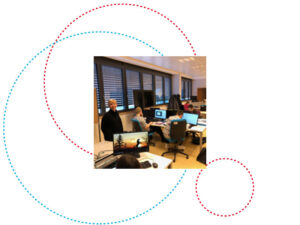Invited by WIDE (Women In Digital Empowerment), Sviatlana Höhn, Post-doc at the Computer Science and Communications Research Unit (CSC), conducted a presentation about chatbots and a hands-on session with 11 school pupils from the Lycée Technique Esch on 6 February 2018. At the end of the workshop, the participants presented their own chatbot prototypes, which they designed by using the platform Chatfuel.
After a short theoretical presentation on chatbot technology, Sviatlana Höhn gave a hands-on workshop for school pupils, who had one clear and exciting challenge: building their own chatbot in 90 minutes, using the plateform Chatfuel. “I had been told by the teachers from the Lycée Technique Esch that the students could not really code, so I chose a platform where they could ideally practice without coding”, explains Sviatlana Höhn. Each student presented his/her own chatbot (a computer program, which simulates human conversation, via auditory or textual methods, through artificial intelligence) at the end of the practical session.

The purpose of the workshop was to inspire and to motivate students to learn more about chatbots and coding, as well as to immerse them into the computer science/artificial intelligence fields, which could be the subject of their studies later on. This was also a great opportunity to connect pupils with women researchers in ICT.
Sviatlana Höhn provided the pupils with few ideas of possible chatbots, but they finally decided to build something completely different. “Everyone had really good ideas while creating a bot. We saw many different concepts such as a bot providing information about drugs and how to sell them (drugstore), another one retrieving song lyrics and linking them to youtube videos, or another explaining Luxembourgish abbreviations to non-native speakers ». Ten distinct chatbots with different features were in total created. At the end of the workshop, the participants discussed their results and Sviatlana Höhn gave them some advice on how to extend and improve their prototypes in the future as well as on how to deal with problems they may face with language complexity and ambiguities.
The workshop was orchestrated by WIDE (Women In Digital Empowerment), a non-profit organisation founded in 2014 in Luxembourg. WIDE’s vision is to offer practical support and activities to include more women and men in the field of digital as well as the contribution to build a more diverse workforce and a wider ICT talent pipeline for Luxembourg.
Another look-alike session is likely to take place during summer semester at a different location.
